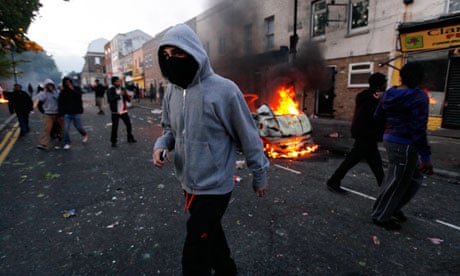Judges and magistrates have been warned not to dispense "rushed justice" after courts sat through the night to deal with hundreds of defendants charged after four days of rioting and looting in England.
A senior member of the Law Society raised concerns over the fairness of hearings and a leading magistrate complained that prosecutors were undermining the power of magistrates and district judges. Nearly 800 defendants have so far appeared in court, half the total arrested.
But the Crown Prosecution Service (CPS) denied justice was being compromised, saying the public wanted to see the law deal with the "really quite extraordinary levels of offending."
Ian Kelcey, who chairs the Law Society's criminal law committee, said: "The main problem is that you are working through the day and they want to get people in from 12 in the evening to six in the morning. I have been talking to a colleague who was cream-crackered by eight in the morning and having to look bright-eyed and bushy-tailed for his day's work."
Lawyers were "trying to achieve some degree of justice for their clients" said Kelcey. "The root of the situation is that you are looking to people's goodwill ... When you get rushed justice, you can end up with rough justice." Solicitors are also angry at planned big cuts in legal aid, especially in London where they may be as high as 25%.
Kelcey said the Legal Services Commission was often taking a long time to pay, up to four months in the case of his Bristol practice, which is owed £300,000.
Julian Young, senior partner at a London law firm, said he had gone 38 hours without sleep at one stage this week, having represented defendants at Westminister magistrates court through Wednesday night. "It was organised chaos," he said.
"Only the professionalism of the CPS, lawyers, district judges and court staff kept it going. Everyone was very tired and the chance of not appreciating an issue, detail or fact was much higher."
Defendants, many aged 14-25, and also short of sleep, were being "asked to make decisions that might affect the rest of their lives and consider and decide complex issues", said Young. "I can understand society wants matters dealt with as swiftly as possible but we cannot sacrifice justice on the altars of speed and expediency."
Courts were not sitting over night on Friday but, in addition to normal emergency remand hearings, two London courts, Westminster and Camberwell, will sit on Saturday, possibly until 6pm. Westminister will also sit on Sunday morning, as may courts in Manchester and Birmingham.
Richard Monkhouse, a member of the magistrates' bench in Trafford, Manchester, and a trustee of the Magistrates' Association, said the CPS was automatically challenging bail applications by defence solicitors. "It is very frustrating. It is removing the power of magistrates and the independency of the judiciary. It is taking the right of bail away from an independent arbiter."
The CPS said: "We are opposing bail in a lot of cases but not automatically." Normally about 3.5% of defendants are remanded in custody, but a Guardian analysis of about 200 riot related cases suggested a figure of about 60%.
Alison Saunders, chief prosecutor in London, told the BBC that prosecutors and magistrates were looking at evidence exactly as normally. "This has to be balanced against the need to make sure we are taking people off the streets," she said.
There had to be "a swift reaction to the great disorder," she said, ensuring "people are dealt with, and if people are pleading guilty, of course, they know whether or not they committed the crimes".
The CPS was independent of politicians, Saunders added. "The public want to see people are dealt with for these crimes and want to be able to have the confidence that both the police and the criminal justice system can deal with it."
Lord Justice Goldring, senior presiding judge,who acts as liaison between the judiciary, courts and government department, said:"This has been a sudden and unprecedented situation which required a unique reaction. District judges and magistrates are continuing to work hard, together with court staff and other agencies, to deal with the urgent court business which has arisen following the recent rioting and widespread public disorder in London and other cities."
The concerns came as the Law Society, together with charity LawWorks and law firms, launched a helpline to direct victims of crime during the riots to free legal advice. Its president John Wotton said it would give practical help to "victims of lawlessness". He added: "It is vitally important that people who need practical help to get their businesses or personal lives back on track in these very difficult circumstances should have a quick route to specialist advice."
